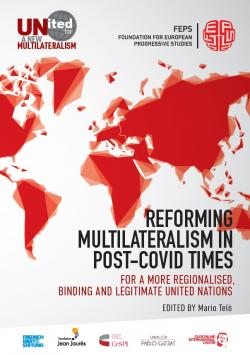Reforming multilateralism in post-COVID times. For a more regionalised, binding and legitimate United Nations
The world is facing a paradox. While the Covid-19 pandemic has confirmed the transnational and common nature of challenges such as infectious diseases, climate change, security, financial stability, extreme poverty, sustainable development, terrorism, etc, the main responses have been at national and local level. And multilateral global governance has been shown to be particularly weak. Defending the past multilateral legacy, and at the same time simply implementing a few managerial adjustments, is not a serious option. We therefore bring substantial arguments showing the urgent need to build a ‘new multilateralism’. This book is not about a dream. It underlines the dynamic trends that already exist, going beyond a mere continuity with the past and addressing with courage the current deficits in multilateral legitimacy, representation and efficiency.
List of tables, p. 7
Foreword. Reforming multilateralism for the 21st century / Maria João Rodrigues, p. 8-12
Introduction. For a new multilateralism: reforming the UN governance through a driving role of the EU / Mario Telò, p. 14-78
1. A new multilateralism: five main features
2. Reforming UN policies and functions
3. The UN institutional system and governance reform
4. The growing responsibility of the EU for multilateralism
Part I – The UN at the centre of a more binding and coordinated global governance
Chapter 1. 21st century reform of the UN Security Council and the role of the European Union / Nico J. Schrijver, p. 82-90
Chapter 2. Is state sovereignty compatible with multilateralism? / Andrew Gamble, p. 92-104
Chapter 3. The Covid-19 inflection point in global governance and the European predicament / Nathalie Tocci, p 106-111
Part II – A radical reform of multilateral governance and the UN through an enhanced role for regional organisations
Chapter 4. Beyond the early 1945 balance between global and regional UN dimensions: historical background and development / Mario Telò, p. 114-117
Chapter 5. Regional organisations and UN reform: towards a flexible interaction mechanism / Luk van Langenhove, p. 118-125
Chapter 6. A Southeast Asian perspective: ASEAN and the UN / Amitav Acharya, p. 126-129
Chapter 7. Regionalising a post-hegemonic and pluralist multilateral system / Qin Yaqing, p. 130-133
Chapter 8. A Euro-South America project for a new inclusive multilateralism and regionalism / Álvaro de Vasconcelos, p. 134-143
Part III – UN reform: inclusiveness, legitimacy and gender issues
Chapter 9. The legitimacy challenge: making the UN more inclusive and democratic / Jo Leinen, p. 146-148
Chapter 10. Justice through gender balance in the United Nations: an urgent matter of consistency / Ruth Rubio Marín and Eulalia W. Petit de Gabriel, p. 150-165
Part IV – UN as a part of a stronger, multifaceted multilateralism
Chapter 11. Beyond the Paris COP 21 treaty: for a more binding global climate governance / Jo Leinen, p. 168-170
Chapter 12. International economic crises and multilateral institutions / Pier Carlo Padoan, p. 172-177
Chapter 13. A new multilateral agenda after Covid-19: the role of the EU / Paolo Guerrieri, p. 178-185
Appendices
Appendix 1. Multilateral organisations and arrangements at regional, interregional and global level / Sebastian Santander, p. 188-231
Appendix 2. The UN system, p. 232-233
Appendix 3. The António Guterres UN reform project, p. 234-242
References, p. 244-259
List of authors, p. 260-264



